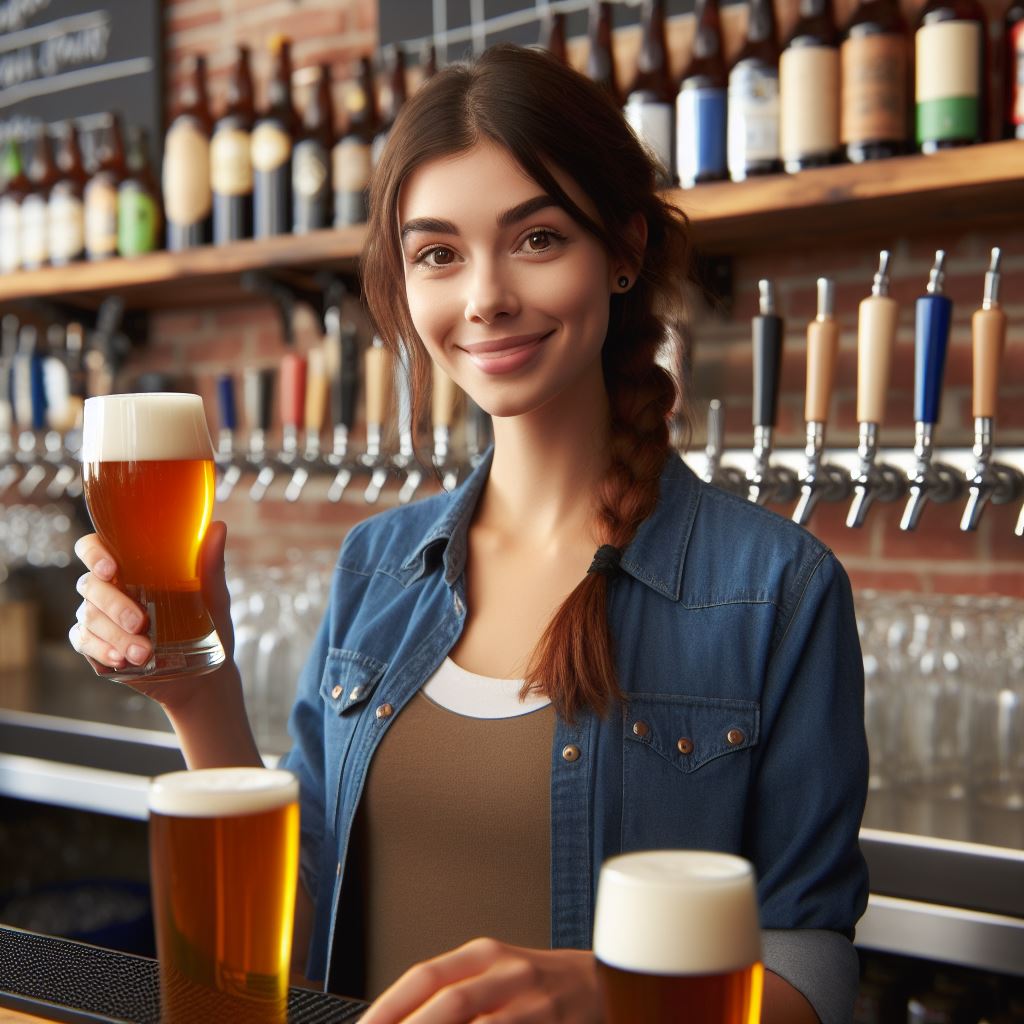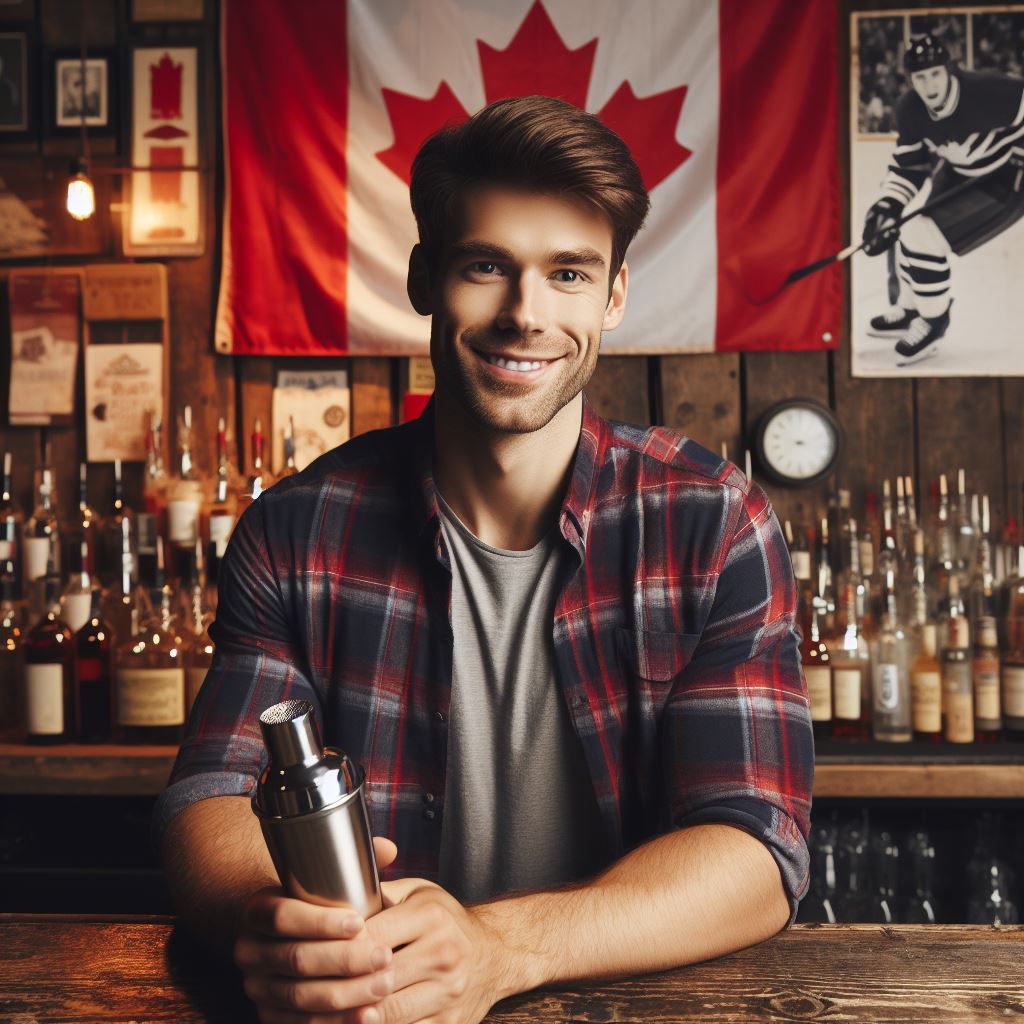Introduction
The role of a bartender goes beyond just mixing drinks, and they play a vital role in the hospitality industry.
Bartenders are not mere drink mixers; they are the life of the party, entertainers, problem solvers, and customer service experts.
They are the ones who create an enjoyable experience for guests and make them feel welcome.
Bartenders have a significant impact on the overall success of a bar or restaurant.
They possess unique skills and qualities that contribute to the ambiance and atmosphere of the establishment.
Their ability to engage with customers and provide personalized service sets the tone for a memorable experience.
Beyond their mixology expertise, bartenders wear many hats.
They are master multitaskers, juggling various roles simultaneously – taking orders, preparing drinks, serving customers, and ensuring the bar is well-stocked.
They are responsible for maintaining cleanliness, managing inventory, and handling cash transactions efficiently.
Bartenders also need to stay updated with current trends, new cocktail recipes, and the ever-evolving preferences of their clientele.
Furthermore, bartenders are skilled communicators.
They must possess excellent interpersonal skills to build rapport with customers and create a friendly environment.
They listen to customers’ stories, lend a sympathetic ear, and sometimes even become the go-to person for advice or emotional support.
In summary, bartenders play a crucial role in the hospitality industry.
They are more than mixologists; they are the heartbeat of a bar or restaurant.
Their expertise in mixology, multitasking abilities, exceptional customer service, and communication skills are all vital components of their role beyond just mixing drinks.
Creating a Welcoming Atmosphere
- Welcoming guests and creating a friendly environment is crucial for a bartender.
- Greeting customers with a warm smile and friendly demeanor can make them feel at ease.
- Taking the time to engage in small talk and asking about their day can establish a rapport.
- Remembering customers’ names and previous orders helps create a personal connection.
- A bartender’s positive attitude can set the tone for a memorable and enjoyable experience.
- Taking the initiative to anticipate customers’ needs and offer recommendations enhances their experience.
- Creating a comfortable and inviting space through music, lighting, and decor is essential.
- Keeping the bar area clean and tidy contributes to the welcoming atmosphere.
- Providing a sense of belonging and inclusivity by welcoming all guests, regardless of their background.
- Being attentive and responsive to customers’ requests and concerns further strengthens the welcoming atmosphere.
The Art of Mixology
- Beyond just mixing drinks, a bartender’s knowledge and skill in mixology are vital.
- Understanding the different flavor profiles and combinations of various spirits, ingredients, and mixers.
- Constantly refining and expanding their repertoire of cocktails and drink recipes.
- Balancing flavors to create delicious and well-balanced drinks that suit customers’ preferences.
- Experimenting with ingredients to create unique and inventive cocktails.
- Mastering the technique of shaking, stirring, and pouring to achieve the perfect drink presentation.
- Knowing the appropriate glassware and garnishes for different cocktails.
- Creating signature cocktails that reflect the bar’s style and identity.
- Staying updated with current trends and new ingredients to offer innovative and exciting drinks.
- Collaborating with colleagues and attending mixology workshops to continuously improve their craft.
Customer Service Excellence
- Providing exceptional customer service is a fundamental aspect of a bartender’s role.
- Ensuring prompt and efficient service to prevent customers from waiting too long for their drinks.
- Paying attention to customers’ preferences, allergies, and dietary restrictions when crafting their drinks.
- Handling difficult customers with professionalism and grace, diffusing tense situations when needed.
- Going above and beyond to exceed customers’ expectations, such as offering personalized recommendations.
- Being knowledgeable about the menu, including ingredients, flavors, and the history behind certain drinks.
- Making suggestions based on customers’ preferences while considering their budget.
- Displaying great communication skills in taking and delivering orders accurately.
- Respecting customers’ privacy and maintaining confidentiality when necessary.
- Thanking customers for their patronage and inviting them to visit again, leaving a lasting impression.
In fact, the role of a bartender goes beyond simply mixing drinks.
Creating a welcoming atmosphere, mastering the art of mixology, and providing excellent customer service are all essential parts of their job.
By focusing on these aspects, bartenders can elevate the overall experience for guests and ensure their satisfaction.
Providing Outstanding Customer Service
As a bartender, providing exceptional customer service is a crucial aspect of the job.
Here are some ways a bartender goes beyond mixing drinks to ensure customer satisfaction:
Listening to customers’ needs and preferences
Having a clear understanding of these key aspects of exceptional customer service is essential to thriving as a bartender.
By providing a welcoming and satisfying atmosphere, bartenders can establish a loyal customer base and enjoy the following benefits:
- Increased customer loyalty: When customers feel heard and understood, they are more likely to return, bringing their friends and spreading positive word-of-mouth about their experience.
- Enhanced tips and earning potential: Satisfied customers are more inclined to leave generous tips, boosting a bartender’s overall earnings and financial stability.
- Improved reputation: Word-of-mouth is a powerful marketing tool, and exceptional customer service can enhance a bartender’s reputation within the industry and among customers.
- Opportunities for career advancement: Bartenders who consistently provide outstanding customer service may open doors to new opportunities, such as promotions or job offers at prestigious establishments.
Skills and qualities bartender must possess to excel in customer service
To excel in customer service, a bartender must possess certain skills and qualities:
- Effective communication skills: Bartenders need to communicate efficiently and clearly with customers, ensuring they understand their preferences and making appropriate suggestions.
- Empathy and patience: Dealing with diverse customer personalities and handling complaints require bartenders to remain calm, understanding, and patient.
- Product knowledge: To provide excellent drink recommendations, bartenders must have an in-depth knowledge of various alcoholic and non-alcoholic beverages.
- Time management: Bartenders need to efficiently serve multiple customers simultaneously, prioritizing tasks and ensuring everyone receives prompt and attentive service.
- Problem-solving skills: Addressing customer complaints and resolving issues require bartenders to think critically and find creative solutions that satisfy the customer.
In short, a bartending role extends beyond simply mixing drinks.
Providing excellent customer service is equally vital and encompasses various aspects, including active listening, personalized recommendations, and effective complaint handling.
By excelling in customer service, bartenders can create a positive environment, cultivate customer loyalty, and advance their careers in the industry.
Read: Top Skills Every Travel Agent Must Have
Knowledge of Alcoholic Beverages
Familiarity with a wide range of alcoholic beverages
- Familiarity with a wide range of alcoholic beverages allows bartenders to cater to various tastes and preferences.
- Understanding the different types of spirits, wines, and beers is essential for bartenders to provide accurate recommendations.
- Bartenders should be knowledgeable about the flavor profiles, origins, and production methods of different alcoholic beverages.
- With this knowledge, bartenders can suggest suitable drinks based on customers’ preferences and help them discover new flavors.
- By staying up to date on the latest trends and launches in the alcohol industry, bartenders can offer unique and exciting drink choices.
- Being aware of the different effects that certain beverages can have on individuals helps bartenders make responsible recommendations.
Understanding the different types of spirits, wines, and beers.
- Bartenders should be able to explain the difference between ales, lagers, stouts, and other beer varieties to customers.
- Knowledge of popular cocktails and their ingredients allows bartenders to create customized drinks for customers.
- Understanding the challenges of pairing different alcoholic beverages with food enhances the overall dining experience.
- Bartenders who have expertise in matching wines and spirits with various dishes can provide valuable recommendations to customers.
- Knowing the appropriate glassware for serving different types of alcoholic beverages helps bartenders create visually appealing drinks.
- By understanding the alcohol content in various beverages, bartenders can help customers make informed choices.
- Bartenders with extensive knowledge of alcoholic beverages can engage in conversations about their products, enhancing customer satisfaction.
Recommending suitable drinks according to customers’ preferences
- This knowledge allows bartenders to recommend beverages that complement customers’ moods and preferences.
- Bartenders who can suggest alternative drink options to customers with dietary restrictions or allergies provide inclusive service.
- Being well-versed in the history of different alcoholic beverages adds a storytelling element to the bartender’s role.
- Bartenders who can share interesting anecdotes and facts about the drinks they serve create a memorable experience for customers.
- Educating customers about responsible drinking practices and offering non-alcoholic options is part of a bartender’s responsibility.
- Bartenders with exceptional knowledge of alcoholic beverages can even organize tasting events or create signature cocktail menus.
- Continuously expanding their knowledge through training programs and attending industry events helps bartenders excel in their role.
- Bartenders who possess a deep passion for alcoholic beverages can create a vibrant and engaging atmosphere in the bar.
- By showcasing their expertise and enthusiasm, bartenders inspire customers to try new drinks and discover their preferences.
In essence, a bartender’s role extends beyond simply mixing drinks. Knowledge of alcoholic beverages and understanding the different types of spirits, wines, and beers is crucial for providing excellent service.
This knowledge allows bartenders to recommend suitable drinks, create customized cocktails, and engage in informative conversations with customers.
By continuously expanding their knowledge and sharing their passion, bartenders create memorable experiences and elevate the overall bar atmosphere.
Read: How to Become a Travel Agent in Canada

Mixology and Drink Preparation
- Demonstrating expertise in cocktail recipes and mixology techniques is a crucial aspect of a bartender’s role.
- Bartenders should have a deep understanding of various liquor brands, ingredients, and their compatibility for creating exquisite drinks.
- Mastering the art of mixology allows bartenders to continuously experiment and develop new flavors and combinations.
- A skilled bartender knows how to balance flavors, textures, and presentation to create a perfectly balanced cocktail.
- They should be knowledgeable about classic cocktail recipes, as well as contemporary trends in mixology.
Creating innovative and unique cocktail creations
- Creating innovative and unique cocktail creations adds a touch of excitement and exclusivity to a bartender’s repertoire.
- Bartenders can elevate the overall experience by introducing customers to inventive and unexpected flavor profiles.
- This creativity serves as a reflection of the bartender’s skills and personality, setting them apart from others in the industry.
- Mixology also involves the use of specialized tools and techniques to enhance drink preparation and presentation.
- Bartenders utilize shakers, muddlers, strainers, and various glassware to create visually appealing and flavorful cocktails.
- Understanding the importance of proper garnishes and embellishments helps bartenders add the final touches to their creations.
Showcasing flair bartending skills for entertainment purposes
- Showcasing flair bartending skills for entertainment purposes can captivate customers and add excitement to the bar atmosphere.
- The art of flair bartending involves the skillful handling and manipulation of bottles, shakers, and other bar tools.
- Bartenders mesmerize guests with impressive tricks like bottle flips, juggling, and creatively pouring drinks.
- While flair bartending is entertaining, it should always be performed safely without compromising the quality of the drink.
- Exceptional bartenders strike a balance between providing top-notch mixology and ensuring customer satisfaction.
- They pay attention to customers’ preferences, allergies, and dietary restrictions while crafting personalized recommendations.
- Bartenders must also communicate effectively, explaining the ingredients, flavors, and origins of specific drinks.
- Developing relationships with customers by engaging in friendly conversations and creating a comfortable environment is essential.
- With their mixology skills and understanding of people, bartenders can create a memorable and enjoyable experience for all.
In a nutshell, mixology and drink preparation play a pivotal role in the bartender’s multifaceted job.
Their expertise in cocktail recipes, innovation, flair bartending, and customer satisfaction make them indispensable assets to any establishment.
Read: Travel Agent vs. Online Booking: Pros & Cons
Maintaining Cleanliness and Safety
As a bartender, it is crucial to prioritize cleanliness and safety in your daily responsibilities.
Not only does this contribute to the overall experience of your customers, but it also ensures a healthy and hazard-free environment.
Here are some key aspects to consider:
Ensuring the bar area is clean and well-organized
A clean and well-organized bar area is essential for providing excellent service and creating a positive impression on your customers.
Here are some steps to maintain cleanliness:
- Wipe down the bar counter frequently to remove spills, stains, and debris.
- Regularly clean and polish glassware, ensuring they are free from smudges or residue.
- Keep the bar tools and equipment properly organized and stored in their designated places.
- Dispose of empty bottles, cans, and other waste promptly to avoid clutter.
Adhering to proper hygiene practices
Maintaining proper hygiene is not only important for your own well-being but also for the safety and health of your customers.
Here are some hygiene practices to follow:
- Wash your hands thoroughly and frequently with soap and water, especially before handling food or drinks.
- Use gloves when necessary, such as when handling raw ingredients or when you have cuts or open wounds on your hands.
- Avoid touching your face, hair, or any other areas of your body while serving customers.
- Regularly sanitize bar tools, cutting boards, and other surfaces to prevent cross-contamination.
Monitoring guest intoxication levels and ensuring responsible serving
One of the key responsibilities of a bartender is to ensure the responsible serving of alcohol.
This involves monitoring guests’ intoxication levels and taking appropriate action when necessary:
- Observe customers closely for signs of intoxication, such as slurred speech, unsteady movements, or excessive loudness.
- Engage in conversation with customers to assess their level of sobriety and make informed decisions.
- Refuse to serve alcohol to individuals who are already noticeably intoxicated or underage.
- Offer non-alcoholic alternatives and food options to help customers pace their consumption.
- Understand and comply with local laws and regulations regarding alcohol service and intoxication.
By prioritizing cleanliness and safety, you contribute to a positive and enjoyable experience for both your customers and fellow staff members.
Remember, a clean and responsible environment not only earns you the trust and loyalty of customers but also ensures a safe and sustainable business in the long run.
Read: Outdoor Adventures: Canada’s Guide Scene
Sales and Inventory Management
As a bartender, your role extends beyond simply mixing drinks. One area where you can make a significant impact is in sales and inventory management.
By utilizing upselling techniques, keeping track of inventory, and collaborating with the management team, you can maximize profitability for the establishment.
Upselling Techniques to Increase Sales
When it comes to maximizing sales as a bartender, upselling plays a crucial role.
By suggesting premium spirits or offering cocktail specials, you can encourage customers to spend more.
Effective upselling requires a keen understanding of customer preferences and the ability to make enticing recommendations.
- Identify the preferences of each customer by engaging in conversation and asking about their taste.
- Suggest higher-priced spirits that complement the customer’s preferences to upsell their beverage choice.
- Create signature cocktails or promote daily specials to entice customers to try something new.
- Highlight the unique features and flavors of premium spirits to justify their higher price.
Keeping Track of Inventory and Ordering Supplies
Efficient inventory management is crucial to ensuring smooth bar operations.
As a bartender, you are responsible for tracking stock levels and ordering supplies when necessary.
By keeping an accurate record and communicating with the management team, you can avoid shortages and reduce wastage.
- Maintain a comprehensive inventory list, including all spirits, mixers, garnishes, and other bar essentials.
- Regularly monitor stock levels to identify when supplies need to be replenished.
- Communicate with the management team to inform them about low stock levels and discuss ordering options.
- Utilize technology, such as bar management software, to streamline the inventory tracking and ordering process.
Collaborating with the Management Team to Maximize Profitability
Effective collaboration between bartenders and the management team is essential for achieving optimal profitability.
By partnering with the management team, you can contribute valuable insights and suggestions to drive revenue and control costs.
Unlock Your Career Potential
Visualize a clear path to success with our tailored Career Consulting service. Personalized insights in just 1-3 days.
Get Started- Regularly communicate with the management team to discuss sales targets and strategies.
- Share customer feedback and preferences to help identify opportunities for menu enhancements or promotions.
- Collaborate on pricing strategies to ensure profitability while remaining competitive in the market.
- Identify areas where costs can be minimized, such as reducing waste or optimizing ingredients.
In review, as a bartender, your role extends far beyond simply mixing drinks.
In the realm of sales and inventory management, you have the power to significantly impact the profitability of the establishment.
By employing upselling techniques, keeping track of inventory, and collaborating with the management team, you can ensure success in this aspect of your bartending career.
Delve into the Subject: How to Start Your Chef Career in Canada
Learn More: Famous Canadian Chefs and Their Signature Dishes
Knowledge of Laws and Regulations
Understanding and adhering to local, state, and federal alcohol laws
As a bartender, it is crucial to have a deep understanding of the laws and regulations surrounding alcohol service.
This knowledge helps you create a safe and responsible environment for your customers.
First and foremost, you must familiarize yourself with the local, state, and federal alcohol laws.
These laws vary from one jurisdiction to another and cover various aspects of alcohol service, including licensing requirements, hours of operation, and drink specials regulations.
Keeping up to date with any changes or updates to these laws is essential to avoid legal issues and ensure compliance.
Checking identification to verify the legal drinking age.
One of the most important responsibilities you have as a bartender is to ensure that your customers are of legal drinking age.
Checking identification is a crucial step in this process.
Whenever a customer appears to be underage, it is your responsibility to ask for a valid ID to confirm their age.
Be familiar with the acceptable forms of identification and ensure that they are not expired.
Refusing service to those who appear intoxicated or underage
Additionally, you need to use your judgment to identify customers who may be intoxicated.
Serving alcohol to someone who is intoxicated not only puts them at risk but also potentially exposes you and the establishment to legal liability.
Signs of intoxication include slurred speech, unsteady movements, and aggressive behavior.
If you suspect someone is intoxicated, it is within your rights and obligations to refuse service.
Similarly, serving alcohol to underage individuals is illegal and can have severe consequences.
In many jurisdictions, bartenders can be held personally liable for serving alcohol to minors, even if they present fake IDs.
It is crucial to familiarize yourself with the various methods employed by minors to obtain alcohol illegally and be vigilant in detecting fake IDs or altered identification documents.
By understanding and adhering to these laws and regulations, you play a crucial role in promoting responsible alcohol consumption and maintaining a safe environment in your establishment.
It is not just about mixing drinks; it is about ensuring the well-being and safety of your customers.
Legal Compliance for Bartenders: Protecting Licenses, Reputations, and Safety
Furthermore, failure to comply with alcohol laws and regulations can result in fines, suspension, and even the revocation of your establishment’s liquor license.
It can also damage your reputation as a bartender and harm future job prospects in the industry.
As a professional bartender, it is your duty to educate yourself and your staff about the laws and regulations pertaining to alcohol service.
Stay informed, communicate with local authorities, and attend regular training sessions to stay up to date with any changes or new requirements.
Remember, your role as a bartender extends beyond mixing cocktails.
You are an ambassador of responsible alcohol consumption, a guardian of safety, and a protector of the law.
Embrace this responsibility and strive to create an enjoyable and safe environment for all your customers.
Conclusion
Bartenders play a crucial role in the hospitality industry.
They go beyond mixing drinks, taking on various responsibilities such as serving customers, managing inventory, and creating a welcoming atmosphere.
Their presence and skills are essential in enhancing the overall customer experience, as they engage with patrons, offer recommendations, and ensure a pleasant atmosphere.
We must appreciate the hard work and multitasking skills required to excel in this profession.
Bartenders need to be knowledgeable, adaptable, and able to handle stressful situations with grace and composure.
By understanding the importance of a bartender’s role and the effort they put in, we can truly value their contribution to the success of a bar or restaurant.
So next time you visit a bar, give your bartender a nod of appreciation for all that they do!




